Digging A Deeper Hole
“Lawyers often ask me, "How should I go about responding to a bar complaint?" The answer is, "It depends."
“You must be truthful and responsive, of course; that's an ethical duty…I am not encouraging anyone to employ a "strategy" in responding to a bar complaint, if that term is construed to mean anything evasive or improper. But if it is your "strategy" to respond appropriately, avoid further trouble and maximize the chances that the complaint will be dismissed (or at least reduce the chances of making things worse), that is what this presentation is about…the content of the lawyer's response is absolutely critical to his or her defense. All too often, lawyers "whip off" responses to
bar complaints in the mistaken belief that their responses are the first step in a dialogue with the Office of Bar Counsel.“DO get your head on straight. A bar complaint is a serious matter even if it is completely without merit. It is a serious matter because it is delivered to you as an official communication from the Kentucky Bar Association, acting as an agency of the Kentucky Supreme Court. That fact alone triggers ethical responsibilities under the Rules of Professional Conduct including, in particular, the duty to respond. (See Rule
8.1). But a bar complaint is not the end of the world, no matter how serious it is. That needs to be said because, sadly, disciplinary problems cause some lawyers to sink into despair and become self-destructive. This, too, will pass, and you'll feel better about it as soon a you get on top of it.“Therefore, DO take the bar complaint seriously but DON’T panic, DON’T beat yourself up, DON’T lash out at the complainant (or anyone else), and DON’T try to “fix” the situation by taking remedial steps without careful consideration (and, preferably, the advice of counsel) regarding their impact on the allegations against you…Bear in mind that the Office of Bar Counsel has already made a threshold determination that the Complaint raises issues about your compliance with the Rules of Professional Conduct. Otherwise, you would not be asked to file a response. Consider the value of confiding in a trusted friend or colleague, in order to have a confidant and coach as you prepare your response. DO take time to acquire a basic understanding of the disciplinary process, so that you will have an understanding of why a file has been opened and what comes next.
“…DO give due consideration to the old maxim that “a man who represents himself has a fool for a client – and a fool for a lawyer.”…You cannot exercise independent professional judgment in evaluating your own situation…You don’t spend most of your time analyzing fact patterns for possible violations of the Rules of Professional Conduct (and the lawyers in the Office of Bar Counsel do)…Your experience in civil or criminal proceedings is not equivalent to experience with the disciplinary process. It is a different arena with different rules, standards and conventions…Your response to the bar complaint will become part of the official record of the case if a charge is filed against you, and may be given greater weight than your answer to that charge.
“Many lawyers decide to prepare their own responses to avoid the expense of hiring an attorney, telling themselves that they can always do so if they receive word that the Office of Bar Counsel finds something significant in the complaint. All too often, they are surprised to find that the next communication they receive is a charge of professional [mis]conduct, and that they are haunted by ill-considered contents of their response throughout the ensuing disciplinary proceeding.
“An experienced disciplinary defense lawyer can help you frame your response in a way that addresses the ethics concerns legitimately raised by the bar complaint and reduces the risk of an expanded investigation.
“…DO “front load” your attention to the matter in the preparation of your response to the complaint. In other words, DON’T make the mistake of “whipping off” a half-baked response while telling yourself that you will take time to prepare a more complete response later if the KBA isn’t satisfied…DO be aware that your response to the complaint will continue to be part of the official record of the case if a formal Charge is filed against you. In fact, your initial response may be given more weight by some of the decision-makers (e.g., members of the Board of Governors and Justices of the Supreme Court) than the “formal” contents of your Answer to the Charge…DO be aware that the Office of Bar Counsel can ask the Inquiry Commission for permission to investigate aspects of the situation that are not placed at issue by the allegations of the complaint, if it concludes from your response (or from any other information) that you may have engaged in misconduct in some way that it is not placed at issue by the allegations of the complaint.
"DO analyze the situation carefully and decide upon an approach which: (a) is truthful; (b) has the best chance of getting the best outcome under the circumstances; and (c) does not run a risk of making matters worse by concealing or “fudging” matters that will come to light as the investigation proceeds.”“…a lengthy and detailed response may “backfire” by raising issues that are not fairly raised by the complaint. It is therefore necessary to analyze the situation and decide upon an appropriate response, just as you would decide upon a strategy in a civil or criminal case. That does not mean deciding whether you should be candid or truthful; that's a given"
“… DON’T submit a response that is formalistic in appearance or legalistic in tone. In
particular, DON’T submit a response that looks like an answer in a civil case or contains ten different defenses that have no application to disciplinary proceedings. Responses of that nature are a great way to get off on the wrong foot with the lawyers in the Office of Bar Counsel, and that should not be your goal.”“DON'T attack the complainant
“DO document your assertions with photocopies of appropriate documents, e.g., pleadings, motions, correspondence, memos to file, telephone logs, time records, handwritten notes, and anything else of a genuine, contemporaneous nature. Abundant documentation goes a long way in satisfying the Office of Bar Counsel and the Inquiry Commission that your side of the story is the one they should believe…DO look for opportunities to show why the complainant does not have an accurate understanding of the situation … DO consider the value of attaching affidavits from appropriate witnesses, who may include law partners, office staff or independent third parties such as former employees or court personnel who witnessed particular events.”
“Not surprisingly, Nifong’s response to the Grievance Committee appears to have been written in vintage Nifongian, leading to additional charges that Nifong had not only lied to the public and the court, but also to the Bar itself."
“This is the fourth and final phase of the Nifong Charge and it is potentially the most devastating. Of course, All are reminded that this is only a charge and must be proven before the appropriate tribunal before there are any consequences.
"The Overall claim of this portion of the complaint is "Misrepresentation and False Statements to State Bar's Grievance Committee".
"The first thing we have to recognize about this charge is that it is different from the preceeding three in the environment in which it is alleged to have taken place. All the other alleged misconduct took place in the rough and tumble biospheres of either the National Press or a hotly contested criminal case. Those environments are not designed to encourage reflective or philosophical thinking or utterances. When responding to a bar complaint, there are two important differences. First, the quality of witnesses against you is high. The Bar Committee is made up of folks who live in the "Question and Answer" format. They understand the gravity of statement made by a party-witness to a disciplinary proceeding. Moreover, the answers given in that environment are in examinee's own writing, with no time constraints and with advice of counsel, or an actual transcript. In other words, unlike the previous environments, there are really no excuses for "misspeaking".
"I view this claim as big trouble, a professional greasefire. The more water the respondent tries to throw onto it, the brigher it burns. Even though it will be different people, the folks determining the outcome of this complaint are the folks who believe they were lied to. They are also the people who have the power to short-circuit an attorney's livelihood. Additionally, the problems with allegations two and four are that they are the kind of conduct which requires reflection. They don't happen on the spur of the moment. It took thought and time to conspire with the scientist to deep six the non-suspect DNA. It took thought and time to compose the answers to the grievance committee. So, if there are mistatements in this phase, they are knowing, intentional and willful mistatements. Not just poor impulse control. Not a good career track.
"There will come a time, I'm guessing, when Nifong's defense position becomes untenable. To me, it would be very surprising if a good deal of time were not allowed to pass in this case and then a negotiated settlement entered into. It is difficult to see how Nifong's defense could sustain the testimony of Judge and a forensic scientist describing his conduct in real time. I would look for, within the bounds of ethical lawyering on both sides, a very slow play on this (preferrably until the criminal case is disposed of) and then a deal."
“Defendant's false statements to the Grievance Committee of the North Carolina State Bar interfered with the State Bar's ability to regulate attorneys and undermined the privilege of lawyers in this State to remain self-regulating."
“The Grievance Committee, however, also occasionally receives responses from lawyers with respect to complaints filed against them under the Rules of Professional Conduct which, of themselves, appear to be, or are, false or seriously misleading. Arguably, the Grievance Committee should respond vigorously in such circumstances. Dishonesty of this nature casts an immediate pall on both the grievance process and the legal profession at large. Often enough, the seriousness of these deceptions exceed in gravamen the underlying grievance to which the lawyer is responding. The State Bar has a rule which can trigger a grievance, sua-sponte, should a lawyer submit potentially false or misleading information in a response to an initial inquiry by the Grievance Committee as a part of any State Bar disciplinary proceeding.”
Misrepresentations and False Statements to State Bar's Grievance Committee.279. On or about December 20, 2006, Nifong received a letter of notice and substance of grievance from the Grievance Committee of the North Carolina State Bar alleging that (a) he failed to provide the Duke Defendants with the potentially exculpatory DNA evidence and test results, (b) he agreed with Dr. Meehan not to provide those results, and (3) he falsely represented to the Court that he was unaware of these results or their omission from DSI's report prior to receiving the Duke Defendants' December 13 motion to compel discovery..279. The allegations contained in paragraph 279 of plaintiff's Amended Complaint are admitted..280. Nifong responded initially in a letter dated December 28, 2006 and supplemented his initial response, at the request of the State Bar's counsel, in a letter dated January 16, 2007..280. The allegations contained in paragraph 280 of plaintiff's Amended Complaint are admitted and attached hereto and incorporated herein by reference are copies of the responses identified in paragraph 280..281. In his responses to the Grievance Committee, Nifong acknowledged that he had discussed with Dr. Meehan during meetings in April and May 2006 the results of all DSI's testing, including the potentially exculpatory DNA test results..281. Defendant incorporates his responses to the Grievance Committee in response to the allegations contained in paragraph 281 of the Amended Complaint. Any remaining allegations contained in paragraph 281 of which are inconsistent with the terms of Exhibit "I" are denied..282. Nifong denied in his responses to the Grievance Committee that he had agreed with Dr. Meehan to exclude the potentially exculpatory DNA test results from DSI's
report..282. Defendant incorporates his responses to the Grievance Committee in response to the allegations contained in paragraph 282 of the Amended Complaint. Any remaining allegations contained in paragraph 282 of which are inconsistent with the terms of Exhibit "I" are denied..283. Nifong represented in his responses to the Grievance Committee that the discussion and agreement with Dr. Meehan to limit the information in DSI's report was based on privacy concerns of releasing the names and DNA profiles of the lacrosse players and others providing known reference specimens..283. Defendant incorporates his responses to the Grievance Committee in response to the allegations contained in paragraph 283 of the Amended Complaint. Any remaining allegations contained in paragraph 283 of which are inconsistent with the terms of Exhibit "I" are denied..284. DSI's report that was prepared and provided to the Duke Defendants, however, listed DNA profiles for the alleged victim, for the alleged victim's boyfriend, and for Dave Evans and Kevin Coleman, two lacrosse players neither of whom had been indicted at the time the report was released..284. The allegations contained in paragraph 284 of plaintiff's Amended Complaint are admitted..285. DSI's report that was prepared and provided to the Duke Defendants also listed the names of all 50 persons who had contributed known reference DNA specimens for testing..285. The allegations contained in paragraph 285 of plaintiff's Amended Complaint are admitted.286. Nifong's representations to the Grievance Committee that his agreement with Dr. Meehan to limit the information in DSI's report was based on privacy concerns of releasing the names and DNA profiles of individuals providing known reference specimens were knowingly false statements of material fact made in connection with a disciplinary matter..286. Defendant incorporates his responses to the Grievance Committee in response to the allegations contained in paragraph 286 of the Amended Complaint. Defendant denies knowingly making a false statement of material fact as alleged in paragraph 286. Any remaining allegations contained in paragraph 286 of which are inconsistent with the terms of Exhibit "I" are denied..287. Nifong further represented in his responses to the Grievance Committee that he did not realize that the potentially exculpatory DNA test results were not included in DSI's report when he provided it to the Duke Defendants or thereafter, until receiving their December 13 motion to compel..287. Defendant incorporates his responses to the Grievance Committee in response to the allegations contained in paragraph 287 of the Amended Complaint. Any remaining allegations contained in paragraph 287 of which are inconsistent with the terms of Exhibit "I" are denied..288. Nifong's representations to the Grievance Committee that he did not realize that the potentially exculpatory DNA test results were not included in DSI' s report from May 12 until he received the December 13 motion to compel discovery were knowingly false statements of material fact made in connection with a disciplinary matter..288. Defendant incorporates his responses to the Grievance Committee in response to the allegations contained in paragraph 288 of the Amended Complaint. Defendant specifically denies knowingly making a false statement as alleged in paragraph 288. Any remaining allegations contained in paragraph 288 of which are inconsistent with the terms of Exhibit "I" are denied..289. Nifong also represented in his responses to the Grievance Committee that, in his statements to the Court at the beginning of the December 15 hearing referred to in paragraphs 264-265 above, he was referring not to the existence of the potentially exculpatory DNA test results but to the Duke Defendants' purported allegation that an intentional attempt had been made to conceal such evidence from them..289. Defendant incorporates his responses to the Grievance Committee in response to the allegations contained in paragraph 289 of the Amended Complaint. Any remaining allegations contained in paragraph 289 of which are inconsistent with the terms of Exhibit "I" are denied..290. Counsel for the Duke Defendants did not allege any intentional attempt to conceal the potentially exculpatory information from them in either their December 13 motion to compel or their remarks to the Court prior to Nifong's comments..290. Defendant incorporates his answers to the allegations contained in paragraph 262 of the Amended Complaint and the transcript of the December 15, 2006 hearing in response to the allegations contained in paragraph 290. To the extent that any remaining allegations are contrary to the matters contained in the December 15, 2006 hearing, said allegations are denied..291. Nifong's above statements to the Grievance Committee concerning his representations to the Court at the December 15, 2006 hearing were knowingly false statements of material fact made in connection with a disciplinary matter..291. The allegations contained in paragraph 291 of plaintiff's Amended Complaint are denied.(State Bar Charges - Nifong's Answer)
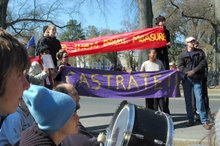




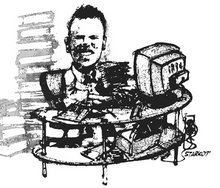
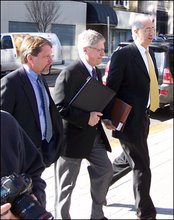
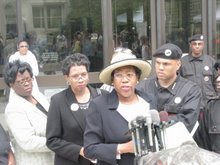
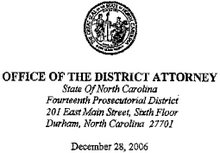
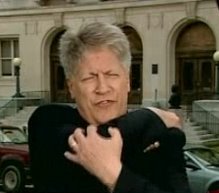

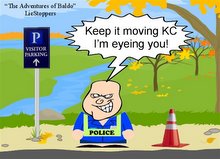

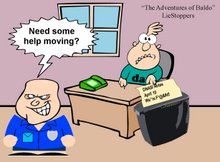

















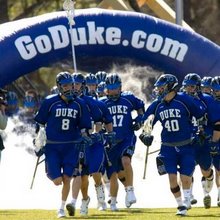

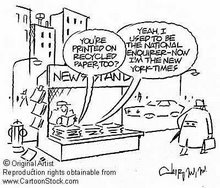

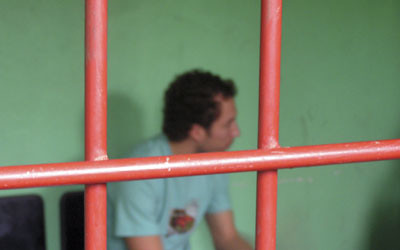
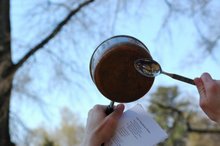


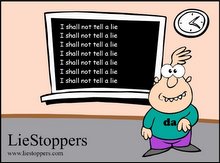






3 comments:
I also wonder if Nifong prepared his pitiful response during office hours when he was supposed to be working for the people of Durham who experienced a 32% increase in violent crimes last year.
9:14 I am sure he did. Ethics is not his long suit. Excellent artice.
Agreed. He's going down.
Post a Comment